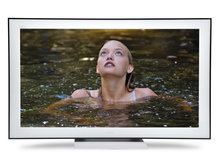LCD screens recycled into human bodies
Scientists find high-tech medical use for old tellies

Old LCD televisions can be given a new lease of life as medical implants, thanks to new research by scientists at the University of York.
The York Green Chemistry Centre of Excellence has found that a chemical found in LCD TVs can be extracted and used in cutting-edge biomedicine.
Polyvinyl-alcohol (PVA) is a key element of liquid crystal display technology. When these sets are thrown away, the LCD panels are usually incinerated or buried in landfill sites.
Biological booze baths
The researchers have developed a technique where recovered material is heated in water in a microwave and washed in ethanol to produce 'expanded PVA'.
Expanded PVA does not provoke a response from the human immune system, making it suitable for use in tissue scaffolds that help parts of the body regenerate. It could also be used in pills and dressings that are designed to deliver drugs to particular parts of the body.
Professor James Clark, director of the York Green Chemistry Centre of Excellence, said: "With 2.5 billion liquid crystal displays already reaching the end of their life, that is a huge amount of potential waste to manage. It is important that we find ways of recycling as many elements of LCDs as possible so we don't simply have to resort to burying and burning them."
Sign up for breaking news, reviews, opinion, top tech deals, and more.
The research is a development from a long term project, funded by the Technology Strategy Board, examining the problems posed by LCD waste.
Mark Harris is Senior Research Director at Gartner.